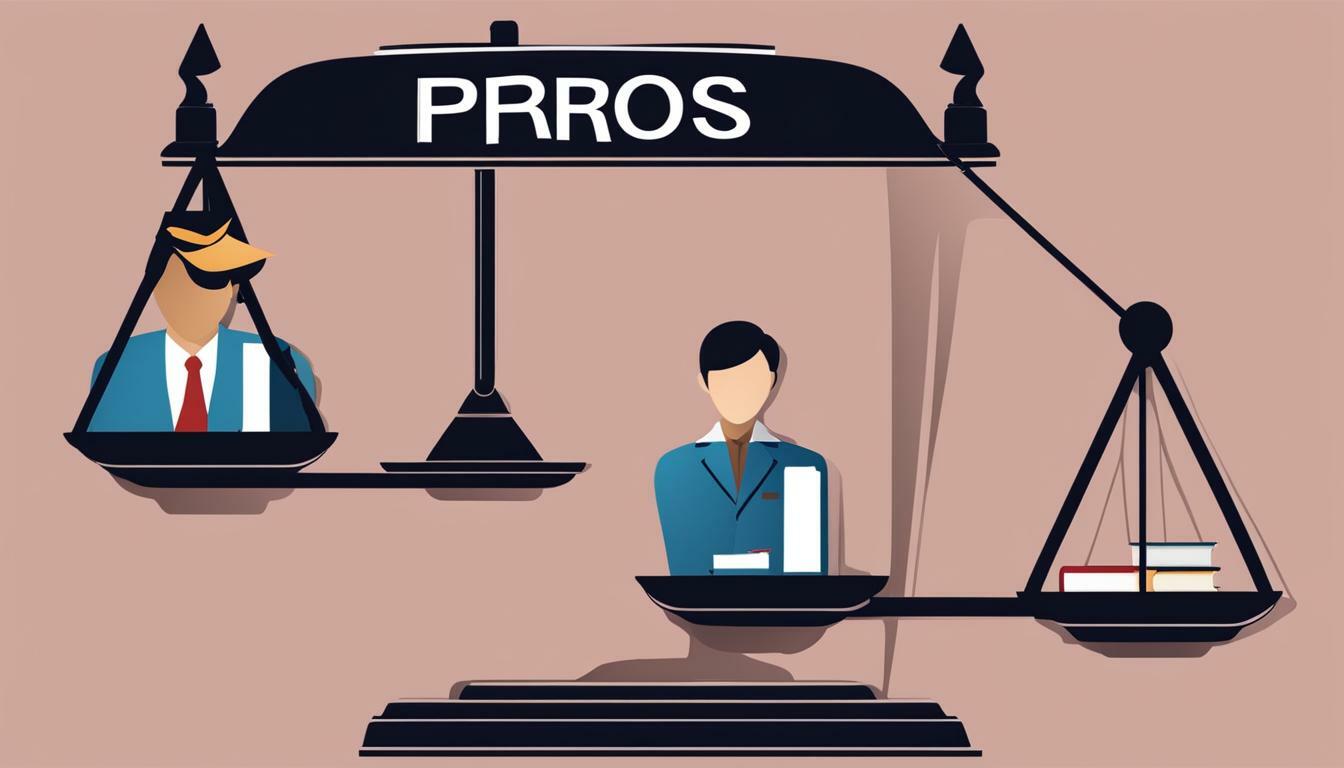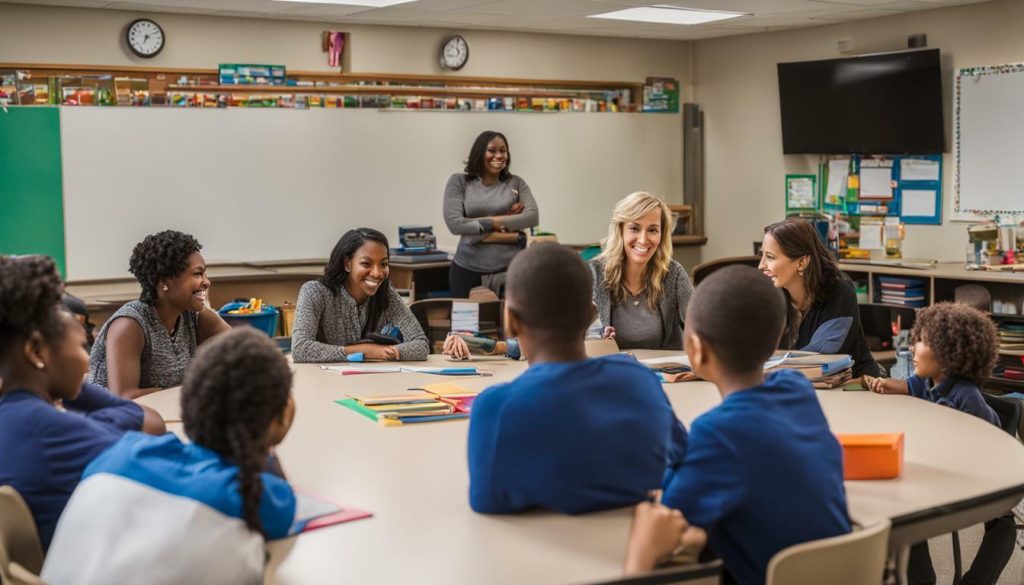
School counselors play a crucial role in supporting students’ psychological, academic, and social development. They are equipped with the knowledge and skills to address a wide range of issues and take on various roles within the school setting. From providing counseling and mediation to teaching social skills and guiding students towards their future careers, school counselors are instrumental in helping students succeed academically and navigate the challenges they face.
However, like any profession, being a school counselor comes with its own set of benefits and challenges. In this article, we will delve into the pros and cons of pursuing a career in school counseling, providing an expert insight into this profession. Whether you are considering becoming a school counselor or simply curious about this field, this article aims to provide you with a comprehensive understanding of the advantages and disadvantages associated with being a school counselor.
Key Takeaways:
- School counselors play a vital role in supporting students’ psychological, academic, and social development.
- They take on various roles such as counselor, mediator, teacher, and consultant.
- The goals of school counseling include supporting students in personal and academic development, resolving conflicts, and providing guidance on career orientation.
- School counselors collaborate with students, parents, teachers, and administrators to create a positive and supportive school environment.
- Being a school counselor has its own set of benefits and challenges, which we will explore in this article.
The Benefits of Being a School Counselor
Being a school counselor offers numerous benefits that can make a positive impact on both students and the counselor themselves. One of the key advantages of this profession is the ability to make a difference in the lives of young people. School counselors have the opportunity to support students through challenging times, provide guidance, and help them achieve their academic and personal goals.
Another benefit of being a school counselor is the variety of roles and responsibilities that come with the job. School counselors act as counselors, mediators, teachers of social skills, and consultants, among other roles. This diversity allows counselors to develop a wide range of skills and knowledge, making each day unique and fulfilling.
“As a school counselor, I am constantly inspired by the resilience and growth I see in my students. It is incredibly rewarding to witness their progress and know that I played a part in their journey.”
In addition to the personal satisfaction that comes from helping students, school counselors also enjoy the advantage of having a stable and in-demand career. With the increasing focus on mental health and the importance of student support systems, the demand for skilled school counselors continues to grow. This provides excellent job prospects and long-term career opportunities for those entering the field.
Overall, being a school counselor offers a rewarding and meaningful career path. The ability to make a positive impact on the lives of students, the diverse range of roles and responsibilities, and the stability of the profession are just some of the benefits that make this career choice stand out.
Table 1: Comparison of School Counselor Benefits
| Benefits | Impact |
|---|---|
| Opportunity to make a difference in students’ lives | Positive impact on students’ development and well-being |
| Varied roles and responsibilities | Development of diverse skills and knowledge |
| Stable and in-demand career | Excellent job prospects and long-term opportunities |

- Support students through challenging times
- Provide guidance and help students achieve goals
- Act as counselors, mediators, and teachers of social skills
- Enjoy a stable and in-demand career
As a school counselor, you have the power to shape the lives of young individuals and make a positive impact on their future. The benefits of being a school counselor extend beyond the personal fulfillment and professional growth. It is a career that allows you to contribute to the well-being and success of students, ensuring they are equipped with the necessary skills and support to navigate their educational journey and beyond.
The Challenges of Being a School Counselor
While being a school counselor comes with many rewards, it also presents unique challenges that require patience, resilience, and dedication. School counselors often find themselves addressing a wide range of issues and taking on multiple roles within the school community. From being a counselor and mediator to a social skills teacher and friend, school counselors face various challenges in their day-to-day work.
One of the key challenges of being a school counselor is the emotional toll it can take. School counselors often work with students who are facing personal problems, such as family issues, bullying, mental health concerns, or academic struggles. Listening to these challenges and providing support can be emotionally draining. It requires counselors to develop strong coping strategies and prioritize self-care to avoid burnout.
Another challenge is the limited resources and high caseloads that school counselors often face. With many students to support, counselors may find themselves stretched thin, making it difficult to provide individualized attention to each student. Additionally, budget constraints may limit the availability of resources and programs that could benefit students. School counselors must be creative and resourceful in finding ways to meet the needs of their students despite these limitations.
| Challenges | Solutions |
|---|---|
| Emotional toll | Developing coping strategies and prioritizing self-care |
| Limited resources and high caseloads | Being creative and resourceful in meeting student needs |
“Being a school counselor requires not only professional expertise but also a deep sense of empathy and compassion. It is challenging, but the impact we can have on students’ lives makes it incredibly rewarding.” – School Counselor
Despite these challenges, school counselors are driven by their passion for making a positive impact on students’ lives. They find fulfillment in helping students navigate through difficult situations, supporting their personal growth, and shaping their future success. It is a profession that requires dedication, resilience, and a deep sense of empathy and compassion.

In conclusion, the challenges of being a school counselor should not overshadow the rewards. While it may be demanding at times, the opportunity to make a difference in the lives of students is invaluable. School counselors play a crucial role in creating a supportive and nurturing environment that fosters students’ overall well-being and success.
The Role and Responsibilities of School Counselors
School counselors take on a multifaceted role, serving as counselors, mediators, teachers, and consultants, among other roles. They play a pivotal role in the academic, social, and emotional well-being of students, providing guidance and support throughout their school years. As counselors, they offer a safe space for students to discuss their concerns, providing individual counseling to address personal and psychological issues. They help students navigate through challenges such as peer pressure, bullying, and family problems, offering strategies and coping mechanisms to overcome obstacles.
As mediators, school counselors facilitate conflict resolution among students and help them build and maintain healthy relationships. They promote effective communication and problem-solving skills, fostering a peaceful and inclusive school environment. Additionally, counselors often take on the responsibility of teaching social skills, equipping students with the tools they need to develop strong interpersonal relationships and navigate social situations effectively.
Furthermore, school counselors serve as consultants, working closely with teachers, parents, and administrators to address student needs. They collaborate with teachers to develop and implement strategies to support students’ academic success. Counselors also provide guidance and resources to parents, helping them understand and navigate the challenges their children may face. They consult with administrators to improve overall school functioning, identifying areas of improvement and implementing programs that enhance student well-being.
| Roles | Responsibilities |
|---|---|
| Counselor | Providing individual counseling to address personal and psychological issues. |
| Mediator | Facilitating conflict resolution and promoting healthy relationships among students. |
| Teacher | Teaching social skills and promoting positive behavior among students. |
| Consultant | Working with teachers, parents, and administrators to address student needs and improve school functioning. |
By fulfilling these various roles, school counselors contribute significantly to the overall well-being and success of students. They provide the necessary support and guidance to help students overcome challenges and thrive academically, emotionally, and socially. Their work is instrumental in creating a positive and supportive school environment that fosters growth and development.

The primary goals of school counseling include fostering students’ personal growth, resolving conflicts, guiding career choices, teaching social skills, and improving overall school functioning. School counselors play a vital role in supporting students in their psychological, academic, and social development, addressing a wide range of issues and taking on various roles within the school community.
One of the key objectives of school counseling is to provide guidance and support to students in their personal and academic development. This involves helping students navigate challenges, develop coping strategies, and enhance their self-esteem. School counselors work closely with students to identify and overcome obstacles that may hinder their progress, promoting a positive and nurturing environment for their growth.
In addition to personal growth, school counselors also play a crucial role in helping students make informed career choices. By providing guidance on career exploration, decision-making, and goal-setting, they assist students in understanding their strengths, interests, and aptitudes. This empowers students to make informed decisions about their future and pursue a career path that aligns with their aspirations and abilities.
Moreover, school counselors also focus on teaching social skills that are essential for students to thrive in their personal and academic lives. They facilitate the development of effective communication, conflict resolution, and problem-solving skills, which contribute to the creation of a respectful and inclusive school community. By promoting positive interactions and fostering healthy relationships, school counselors enhance overall school functioning and contribute to a harmonious learning environment.

| Benefits of School Counseling: | Challenges of School Counseling: |
|---|---|
|
|
The Importance of Collaboration in School Counseling
Collaboration is a key aspect of school counseling, as counselors work closely with various stakeholders to ensure the well-being and success of students. School counselors play a vital role in supporting students in their psychological, academic, and social development, and collaboration allows them to address a wide range of issues effectively. By working collaboratively with students, parents, teachers, and administrators, school counselors can create a positive and supportive school environment that fosters growth and success.
One important aspect of collaboration in school counseling is working with students directly. School counselors engage with students individually or in groups to provide counseling and guidance on various personal and academic matters. They help students navigate challenges, set goals, and develop strategies for overcoming obstacles. By collaborating with students, school counselors empower them to take responsibility for their own learning and personal development.
Another essential aspect of collaboration is working with parents and guardians. School counselors understand the importance of involving parents in their child’s educational journey. They work hand-in-hand with parents to provide support, answer questions, and address concerns. Through open and honest communication, school counselors and parents can work together to create a supportive network that promotes academic success and emotional well-being.
In addition to students and parents, collaboration extends to teachers and administrators. School counselors collaborate with teachers to develop strategies and interventions to support students’ academic progress. They work with administrators to implement school-wide programs and initiatives that address the unique needs of the student population. This collaboration ensures that all students have access to the resources and support they need to thrive in the school environment.

Ultimately, collaboration in school counseling is crucial for creating an inclusive and supportive environment for students. By working together, school counselors, students, parents, teachers, and administrators can foster academic excellence, personal growth, and emotional well-being. Through collaboration, school counseling professionals can make a significant positive impact on the lives of students and contribute to their overall success.
Conclusion
Being a school counselor offers both rewarding benefits and unique challenges, making it a career choice that requires careful consideration. School counselors play a vital role in supporting students in their psychological, academic, and social development. They address a wide range of issues and take on various roles, including counselor, mediator, social skills teacher, friend, disciplinarian, psychologist, teacher, and consultant.
The ultimate aim of school counseling is to help students succeed academically and prepare them for their future careers. The goals of a school counseling program include supporting students in their personal and academic development, resolving conflicts, helping students face personal problems, providing guidance on career orientation and decisions, teaching social skills, and improving overall school functioning.
In order to achieve these goals, school counselors collaborate with students, parents, teachers, and administrators to create a positive and supportive school environment. This collaboration is essential in ensuring the success and well-being of students.
While being a school counselor can be fulfilling and rewarding, it is important to acknowledge the challenges that come with the profession. School counselors often face heavy workloads, high levels of stress, and the need to balance multiple responsibilities. However, the impact they have on the lives of students and the opportunity to make a real difference in their futures make these challenges worthwhile for many.
FAQ
What is the role of a school counselor?
School counselors play a vital role in supporting students in their psychological, academic, and social development. They address a wide range of issues and take on various roles, including counselor, mediator, social skills teacher, friend, disciplinarian, psychologist, teacher, and consultant.
What are the goals of a school counseling program?
The goals of a school counseling program include supporting students in their personal and academic development, resolving conflicts, helping students face personal problems, providing guidance on career orientation and decisions, teaching social skills, and improving overall school functioning.
Who do school counselors collaborate with?
School counselors collaborate with students, parents, teachers, and administrators to create a positive and supportive school environment.



